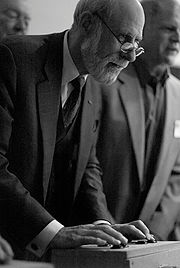
Vinton Cerf is one of the masterminds behind the original technology that drives the internet and is outspoken about how information should be made available on the internet.
As many countries, including Australia, take steps to restrict access to certain classes of information the debate around government censorship of the internet is heating up. Cerf is at the eye of the storm as both a highly visible and respected internet pioneer and senior evangelist for the world’s largest provider of information, Google.
Cerf says that we may be looking forward to a time when availability of information on the internet will be fragmented depending on which country you are living in. Of course, these divides already exist and are at the heart of Google’s struggle with the Chinese government as well as being commonplace in countries such as Iran where political censorship and filtering of the Internet is politically entrenched. What Cerf is more alarmed about is how governments in democratic countries such as the USA, Australia, Britain and countries in the EU will exert more and more control over the information available to their citizens via the internet.
”You’re seeing different reactions in different countries. I’m curious if their reactions are the consequences of never having experienced this kind of openness before, or whether it is a political threat that drives the position.”
The borderless nature of the internet was not accidental, according to Cerf. During the development of internet technology in the 70’s there was a deliberate avoidance of using addressing structures that were related to countries or borders. Technically, the only relevant concern was which networks were linked to enable the passage of information through them and to them. It seems to be an open invitation, of course, to governmental panic resulting in the sort of whiplash effect we’ve recently seen in China and Italy with Google and are seeing, in a less dramatic way, in Australia and the USA. Less dramatic, but equally important in terms of fuelling the debate as to where the line should be drawn between freedom of information and legitimate government censorship of the internet.
Cerf is concerned that not only will the filtering infrastructure deny access to a lot of legitimate information but that the technical infrastructure itself will slow the internet down and make the indexing of sites by search engines such as Google an almost impossible task as each piece of indeed information will need to be vetted according to the filtering requirements.
The difficult area is that while countries understand the benefits of information sharing on the internet they also see that practices such as digital terrorism, large-scale crime, fraud, spam, stalking and pornography are on the rise (see my next posting on the 2010 digital crime report from McAfee). The sensitive part of the debate, as with all debates about censorship, is not whether some of these areas need to be excluded from the internet but where the line is drawn between legitimate threat or security risk and governments taking on the role of our political, moral and ethical minders.
Some more thoughts from Cerf:
The good thing is about the internet is everything is connected: the bad thing about the internet is everything is connected.
The yin and yang of all of this is that the information exchange, the ability to work collaboratively and so on, is counterbalanced by some of the vulnerabilities either to the society or to the individual or the equipment on the system.



